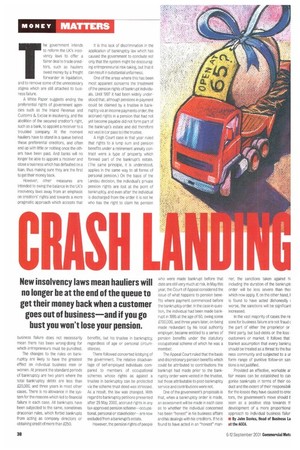T he government intends
Page 38

If you've noticed an error in this article please click here to report it so we can fix it.
to reform the UK's insolvency laws to offer a fairer deal to trade creditors, such as hauliers owed money by a freight forwarder in liquidation, and to remove some of the unnecessary stigma which are still attached to
bsiness failure.
A White Paper suggests ending the preferential rights of government agencies such as the Inland Revenue and Customs & Excise in insolvency, and the abolition of the secured creditor's right, such as a bank, to appoint a receiver to a troubled company. At the moment hauliers have to stand in a queue behind these preferential creditors, and often end up with little or nothing once the others have been paid. And banks will no longer be able to appoint a receiver and close a business which has defaulted on a loan, thus making sure they are the first to get their money back.
However, other measures are intended to swing the balance in the UK's insolvency laws away from an emphasis on creditors' rights and towards a more pragmatic approach which accepts that It is this lack of discrimination in the application of bankruptcy law which has caused the government to conclude not only that the system might be discouraging entrepreneurial risk-taking, but that it can result in substantial unfairness.
One of the areas where this has been most apparent concerns the treatment of the pension rights of bankrupt individuals. Until -1997 Chad been widely understood that, although pensions in payment could be claimed by a trustee in bankruptcy via an income payments order, the accrued rights in a pension that had not yet become payable did not form part of the bankrupt's estate and did therefore not vest in for pass to) the trustee.
A High Court case in that year ruled that rights to a lump sum and pension benefits under a retirement annuity contract were a type of property which formed part of the bankrupt's estate. The same principle, it is understood, applies in the same way to all forms of personal pension.) On the basis of the Landau decision, the individual's private pension rights are lost at the point of bankruptcy, and even after the individual is discharged from the order it is not he who has the right to claim his pension




































































































































